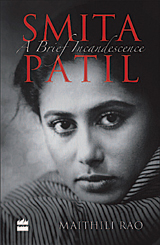
When Smita Patil died at the impossibly young age of 31, Smita Patil was indubitably one of Indian cinema’s biggest icons
SMITA PATIL surmounted an actor’s biggest challenge — of acting without appearing to do so and total immersion in a role to an extent that viewers can nearly forget they are seeing a performance. And then, those mesmerising, smouldering and expressive eyes!
In her short life and career, Smita managed a gamut of earthy and complex performances, rendered with such intensity, empathy and maturity that older and more experienced actors would find hard to pull off. And she was prolific — in a career that stretched just over a decade, she managed nearly 80 films, including some of the most path-breaking ever made in India — and some utterly dreadful, redeemed partly by her presence despite the atrocious dialogues, situations and dresses heaped on her.
When she died at the impossibly young age of 31, Smita Patil was indubitably one of Indian cinema’s biggest icons. As one of Indian cinema's most accomplished actresses, she personified intensity in her "parallel" cinema roles and a refined sensibility in mainstream ones, and in real life, was unpretentious, spontaneous, and daring, had hitherto been underserved as far as a comprehensive story of her life is concerned. Bringing together the stories of Smita the person and Smita the actress is veteran film critic and writer Maithili Rao, who stresses that her attempt is not a “conventional biography” and neither a “collection of anecdotes" but actually recounting of Smita’s life - on and off-screen - and assessing her “significant films in their context and from the perspective of distance that time has given us”.
Rao, who has been a long-standing columnist and contributor to various anthologies on Indian cinema, has been through - interacting with not only Smita's family (including her mother Vidya Patil who passed away some months before the book released), close friends and her most significant films' directors - Benegal (who has also furnished a brief but incisive foreword noting Smita’s rise to rare heights as an actress in a film industry whose stereotypical demands and definitions of feminine beauty she never met), Jabbar Patel, Arun Khopkar (whose FTII diploma film was her debut), Ketan Mehta, Mahesh Bhatt, Ramesh Sippy, Saeed Mirza, Sandeep Ray (for his illustrious father Satyajit Ray's recollections) and many other actors - contemporary and modern - right down to Smita’s faithful make-up man.
She however refrains from focussing on relationships, specifically her controversial marriage to an already-married Raj Babbar, since she never knew Smita's own version and Raj was not keen on talking about it (though she notes he made his peace with her family). Smita Patil: A Brief Incandescence, tells her remarkable story, tracing it from her childhood to stardom, controversial marriage and untimely death. From the difficult equation she shared with her mother to her propensity for ‘wrong’ relationships, about which she was always open unlike other stars of the time, this is a complex and honest exploration of Patil’s life. The book also includes a critique of the films that defined her.
Some interesting facets of Smita's life come to light - she was never a FTII student but was always thought to be so because she regularly hung out there, was fond of driving motorcyles and army 'jongas' (according to elder sister Aruna, she and her friend once drove one from Delhi to Bombay, including through the then badlands of Chambal - only being careful not to let her parents know), could give the choicest abuses when angered, a dab hand at photography, and very fond of children (and raising them). But that is not the point of this book that highlights Smita's best known films, in which she invariably played a character dealt a bad hand by fate - in shape of caste, custom, economics, or relationships - but still fighting back, be it the feisty and fiery Bindu of “Manthan”, troubled actress Usha in “Bhumika”, freespirited gypsy Ujaan in “Bhavni Bhavai”, widow Amma coming to terms with the corrupting influence of poverty in a big-city slum in “Chakra”, Hyderabadi woman Najma who amorally sells a younger innocent woman to an older husband in “Bazaar” to help her own uncertain love life, upper class woman with a burning conscience.
